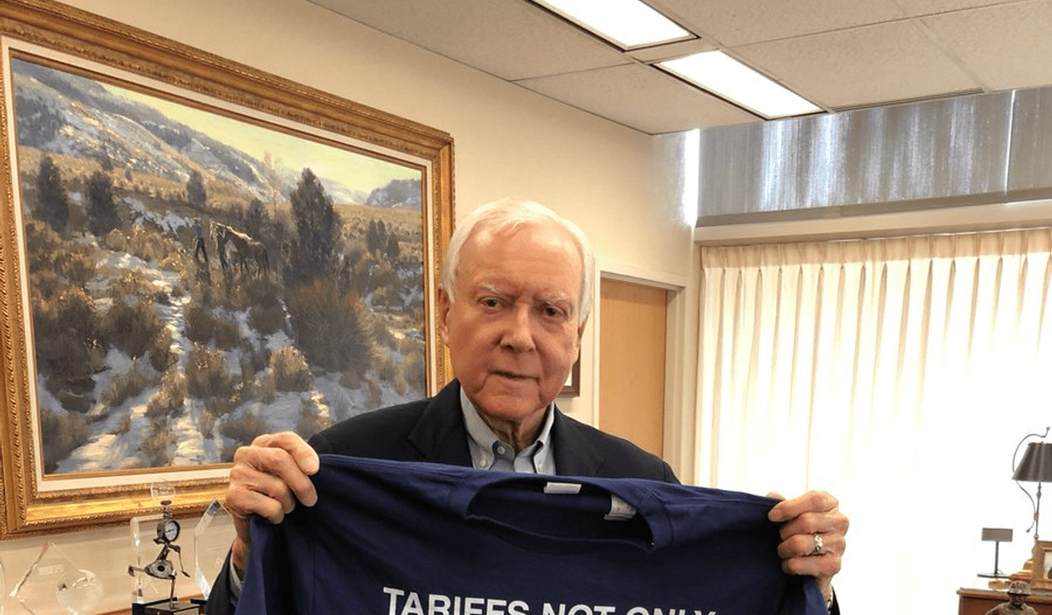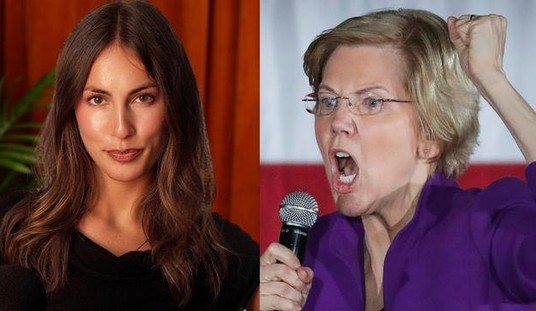Hundreds of people, and a U.S. Senator, have bought or displayed t-shirts with a rather long message against tariffs: TNOIIECBAFTATPPAAFPDATW. Scott Lincicome, a visiting lecturer at Duke University, an adjunct scholar at the Cato Institute, and an accomplished international trade lawyer, explained the message, and told PJ Media just how many shirts have sold. Josh Jordan, his partner on the project, explained that the shirts are still selling on Amazon.
“Over 700 originals sold, last I heard. No idea abt knockoffs. Several ‘political celebs’ have purchased them, but no ‘real’ ones that I know of. Alas,” Lincicome, the creator of the t-shirts, told PJ Media.
Over 700 originals sold, last I heard. No idea abt knockoffs. Several "political celebs" have purchased them, but no "real" ones that I know of. Alas.
— Scott Lincicome (@scottlincicome) April 25, 2018
While he may not count as a “real” celebrity, Sen. Orrin Hatch (R-Utah) sported the t-shirt in a well-circulated picture that even appeared on NBC’s “Meet the Press.”
https://twitter.com/mattdizwhitlock/status/981979484017508352
Other people have also shared pictures of the TNOIIECBAFTATPPAAFPDATW shirts on Twitter.
The #TNOIIECBAFTATPPAAFPDATW tee making a 'no-pants Spring' appearance. pic.twitter.com/G9hgTwEVpl
— lizbuddie (@lizbuddie) April 6, 2018
Weekly Standard reporter Haley Byrd rocked the anti-tariff T.
https://twitter.com/byrdinator/status/975874188597743616
Katherine Mangu-Ward, editor-in-chief of Reason magazine, rocked the TNOIIECBAFTATPPAAFPDATW shirt.
https://twitter.com/kmanguward/status/976086704053506048
Dan King, a writer at Reason and National Review Online, also sported the t-shirt.
I spent half an hour of my Friday at work modeling #TNOIIECBAFTATPPAAFPDATW
CC: @scottlincicome pic.twitter.com/tzEs3AMjFz
— Dan King 🌐 (Matisse Thybulle Stan Account) (@Kinger_Liberty) April 6, 2018
Here’s Anthony Sanders, a senior attorney at the Institute for Justice.
Bringing my new #TNOIIECBAFTATPPAAFPDATW shirt to the office for @IJ casual Friday! (And helping @feeonline in the process.)
Cc: @scottlincicome @NumbersMuncher @rlorenc pic.twitter.com/sVCvHULgeU
— Anthony Sanders (@IJSanders) April 13, 2018
So what does it mean?
The front of the t-shirts reads, “Tariffs not only impose immense economic costs but also fail to achieve their primary policy aims and foster political dysfunction along the way.”
“It was a joke because a woman at the Trump rally over the weekend was waring a giant ‘I love tariffs’ shirt or something like that,” Lincicome told Ricochet’s Jon Gabriel and Stephen Miller, on the radio show “The Conservatarians.” “So, in a fit of dark humor, I posted a rebuttal t-shirt that of course was this hundred-word response. But it’s funny, right?”
— Scott Lincicome (@scottlincicome) March 11, 2018
The shirts sell for $22.49 on Amazon, and Lincicome explained that the profits will go toward FEE, the Foundation for Economic Education. In March, he said the shirts had raised “almost $1,000.” At $3 profit per t-shirt, the 700 number would mean $2,100 for FEE, as of Wednesday. Indeed, last Friday, Josh Jordan shared that he had donated $2,064.75 to FEE.
A huge thanks (and virtual hugs) to every one of you that bought the Tariffs shirts that were inspired by @scottlincicome. We just received the first royalty payment for them, and all of it was donated to @feeonline for their free trade educational programs. Thank you so much! pic.twitter.com/gzWrYcRVgP
— Josh Jordan (@NumbersMuncher) April 21, 2018
On Thursday, Jordan told PJ Media that he does not know specifically how many have sold (due to Amazon’s “semi-limited” reporting), but the “rough estimate” is “about 870 shirts.” He announced that he will keep donating to FEE as long as the shirts sell.
I can give more details… they aren't 100% specific since Amazon's reporting on shirts is semi-limited, but a rough idea anyway.
Rough estimate as of right now is about 870 shirts have sold. Each one nets just over $3 for FEE, and we'll keep donating as long as they sell. :)
— Josh Jordan (@NumbersMuncher) April 26, 2018
The t-shirts come with many options: “The bestselling is the 2-sided (most expensive, too) at about 500 total,” Jordan explained. “Next is the one-sided quote one at 320. The one-sided chart one at 40. Not a bad way to raise some $$ and have a little fun during some bizarre times!”
If you want more specifics (ha)…
The bestselling is the 2-sided (most expensive, too) at about 500 total
Next is the one-sided quote one at 320
The one-sided chart one at 40Not a bad way to raise some $$ and have a little fun during some bizarre times!
— Josh Jordan (@NumbersMuncher) April 26, 2018
The shirts always had a limited market — “giant economics nerds and also with a silly sense of humor,” Lincicome quipped, to “The Conservatarians.”
The economist explained the t-shirt’s meaning, step by step, on the radio show. (His original 33-page paper is available from Cato.)
“Tariffs … impose immense economic costs.”
“The broad principles on tariffs are almost universally accepted amongst economists,” Lincicome began. “A tariff is a tax on consumption of imports. Tariffs are not paid by foreign exporters or foreign governments — they are paid by American importers and American importers then pass those costs on to you and me as the consumer, or eat those costs and thus have fewer dollars available for investment and jobs.”
“When you hear about tariffs being slapped on China — no! — it’s actually being slapped on American consumers’s imports from China,” the economist explained. “So, you have immediate pain being felt by American consumers.” While the Chinese exporters would feel pain later, the direct pain falls on Americans first.
Lincicome did not end there, however. “The second problem is that tariffs by design create an island of sorts, of high priced goods, whatever the tariff applies to,” he added. “That raises the price of whatever good you’re protecting. that hurts you and me, of course, because we consume less, we have fewer dollars available to consume stuff. If we pay more for a t-shirt that means we have less money for food or whatever.”
This restriction of trade hits poor Americans most. It also restricts manufacturing, which often uses imports as raw materials.
Lincicome also explained that tariffs come with “unseen costs,” which he argued would be “bigger” than the “seen costs.”
“Tariffs … fail to achieve their primary policy aims.”
When imposing tariffs, “what you’re doing is you’re discouraging free market competition, which has these immense benefits,” he said. Americans “seem to innately understand” the benefits of competition on the small scale, but “our brains kind of shut off when we walk about trade.”
International trade, Lincicome noted, “is very beneficial: it forces innovation, it forces creativity.” He contrasted U.S.-produced cars from the 1970s and early 1980s from the American automobiles of today. “foreign import competition drove those American companies to get better.”
The protectionism of tariffs, however, “gives us less innovation, less dynamism, a slower GDP, and it just makes us all worse off in the long run.” Tariffs “impose massive costs on consumers, hundreds and hundreds of thousands of dollars per year, per job potentially saved in the domestic industry.”
Worse, they protect domestic companies from competition, and they end up stagnating. Lincicome pointed to the U.S. steel industry, which has been “probably the most protected industry” in American history, and the protection over the last fifty years has resulted in stagnation. “The steel industry, instead of adopting innovations, has sat behind these tariff walls and kind of stagnated over the years.”
“So, you’ve imposed these massive costs and you still haven’t achieved what your primary policy goal was — creating this vibrant domestic industry. It’s actually very much the opposite,” the economist quipped.
“Tariffs … foster political dysfunction along the way.”
While Lincicome did not explicitly address the “political dysfunction” from tariffs during the Conservatarians show, the issue came up naturally in conversation with Gabriel and Miller.
“Another kind of hilarious sign that the only kind of people supporting this are the protectionist far-Left Democrats, which you would think would give some people on the Right pause, but we live in a very incoherent time,” the economist said.
Miller laughed, mockingly asking, “Trump has Democrat policy tendencies?” For this reason, and for Trump’s checkered moral past, many conservatives opposed Trump in the 2016 Republican primary.
“I love that I am frequently called a liberal for [opposing] a policy that is universally loathed by most conservatives, most libertarians, most Republican politicians, but then loved by Bernie Sanders. But yes, I am the liberal,” Lincicome quipped.
The economist suggested that Trump favors tariffs largely because he does not understand the nature of the trade deficit, on which the president has “a very zero-sum mind-set.”
“You and I are voluntarily choosing to spend our money that way, that is not some sort of evil, pernicious — the Chinese don’t have a giant vacuum cleaner that is sucking money out of our pockets,” Lincicome explained. Furthermore, for every $500 billion Americans send to China, “we are getting stuff in return, we are getting goods and services that we value.” Many manufacturers rely on imports to remain competitive.
In steel, there are “6.5 million Americans working in industries that consume steel, and only about 150,000 that work in the steel industry,” the economist noted. Why favor the 150,000 over the 6.5 million?
Finally, the trade deficit is also offset by what foreigners actually do with the U.S. dollars they are paid. “Every dollar we send abroad must eventually come back to the United States,” either being “spent on American exports of goods and services,” or being “invested in the United States,” either in private real estate or companies or in public assets like U.S. debt.
“All of those dollars end up coming back — it’s almost an exact mirror image of capital investment surplus,” Lincicome explained.
Chinese trade introduces other issues that Lincicome did not address. Chinese companies reportedly ask for trade secrets in order to do business with American companies, which facilitates the theft of intellectual property. These are serious issues, but Lincicome has argued that tariffs are not the right response to them (he has proposed concrete solutions that do not violate WTO rules at Cato). Some cures are worse than the disease.
Readers can purchase the shirts at Amazon. For more on the negative impacts of tariffs on U.S. trade throughout history, read Lincicome’s 33-page paper.
Last, but not least, free market devotees should appreciate this little detail: the t-shirts have been imported.
And, obvs: pic.twitter.com/dwbBOjIJdw
— Scott Lincicome (@scottlincicome) March 12, 2018









Join the conversation as a VIP Member